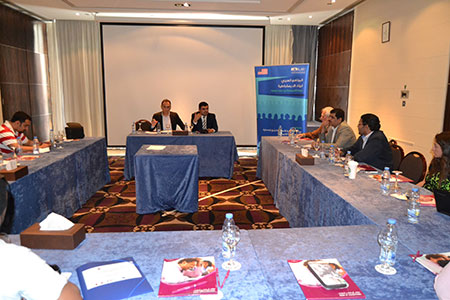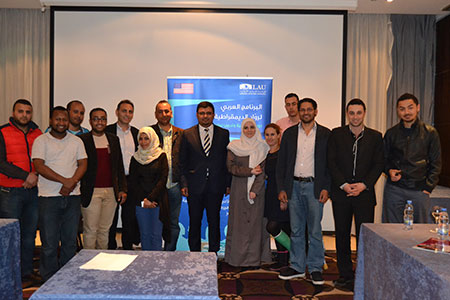- English
- عربي
News & Events
The Vice-President of the Tunisian Parliament, Khaled Shawkat is hosted by the Leaders for Democracy program
Significant challenges facing democracy in post -revolution Tunisia.
In the final stage of the Leaders for Democracy Arabic Program 2015, organized by the Lebanese American University and funded by the Middle East Partnership Initiatives program (MEPI), the leaders hosted The Vice-President of the Tunisian Parliament, Khaled Shawkat at the Crown Plaza hotel in Beirut attended by the Lebanese Tunisian Friendship Committee in Parliament, Marwan Fares as well as the coordinator for the LDF program, Imad Salamey. Mr. Shawkat moderated a seminar during which he spoke about the Tunisian experience in reform and democracy.

Mr. Shawkat indicated that the success of the revolution in Tunisia, so far, can be attributed to public awareness and the high percentage of educated citizens due to the assiduous efforts of the late leader Bourguiba who invested in people by of promoting gender equality, prohibiting polygamy and investing in the health sector, which have led to the integration of modern and civilized ideas such as democracy.
Mr. Shawkat also spoke of Bin Ali’s iron fist presidency, with its many successes at the onset that turned into a time of tyranny which ignited the Tunisian revolution.
According to Mr. Shawkat, the Tunisian revolution which was launched on December 17, 2010 in Sidi Bouzid, was an uprising against tyranny and a call for a balanced growth amongst the various Tunisian regions. The revolution succeeded in ousting Bin Ali in January 2011. It gave rise to the challenge of conducting general elections in October 2011 which brought the Islamic factions to power.
Mr. Shawkat added that the political assassinations in Tunisia, most notably Shukri Beleid and Mohamed Al-Ibrahimi, stirred public mobilization and the civil society uprising which coincided with the fall of the Muslim Brotherhood in Egypt put pressure on Islamists in Tunisia and forced them to share the power with civilians.
He added that these events led to the national dialog amongst the civil factions dubbed the national dialog roundtable. It called for national conscience freedom and contributed to the rise of organizations guaranteeing freedom and national rights and to holding general elections on October 26, 2015. He also confirmed that in today’s Tunisia there is a parliament, a first in the country’s history, a president elected directly by the people and a national government of all national political classes, an extraordinary achievement for the Tunisian revolution.
 Mr. Shawkat highlighted four basic challenges facing democracy in Tunisia at the moment:
Mr. Shawkat highlighted four basic challenges facing democracy in Tunisia at the moment:
“First: The political challenge to achieve stability in government institutions due to the existence of fairly new democratic parties that are dependent on populist leadership.
Second: The development challenge of finding solutions to economic problems and the taxation system whereby, in the event that democracy fails to realize developmental objectives it will be at risk in the future.
Third: The terrorist challenge which presents a grave danger to security and stability in that the terrorist groups possess the funds, the terror factor and the territory and aim at the eradication of the government and democracy.
Fourth: The cultural challenge since democracy is a cultural alternative to dictatorial thinking that persisted for 14 years in Tunisia and the preservation of democracy is in need of advanced cultural, educational and intellectual awareness.
In his closing remarks, Shawkat hoped that democracy would endure and prosper in Tunisia and that all challenges can be overcome through the will and unity of the Tunisian people.
The seminar was concluded in a debate during which Shawkat answered the questions of the participants.
Translated article
